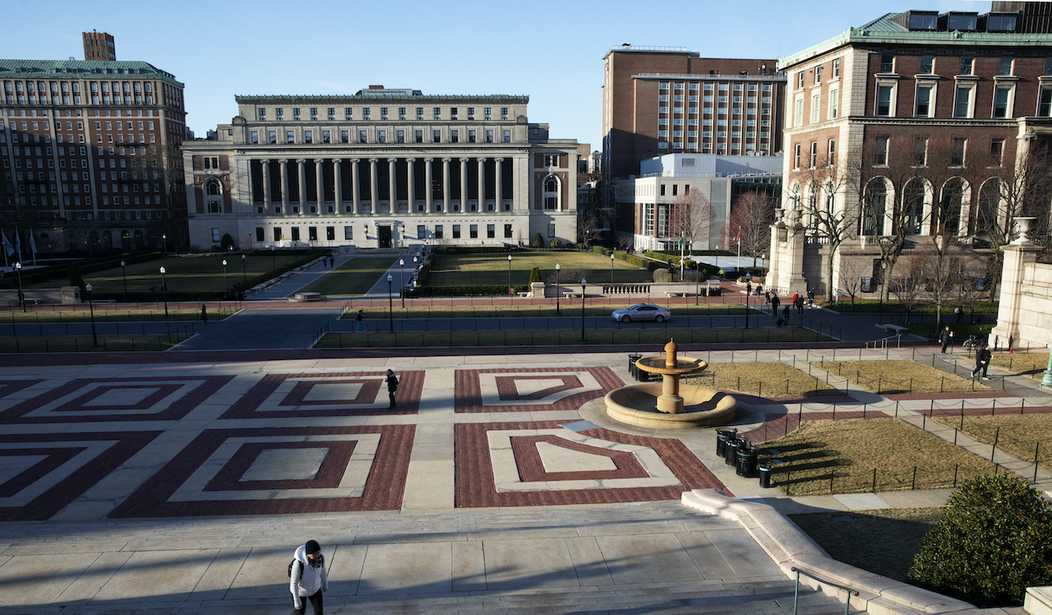Carve out some time this weekend for this WSJ piece, one of the best hate-reads I’ve had in ages. It’s long but I promise that it’s worth it.
How often do you a read a major investigative piece in which literally every person mentioned in it sucks?
The Journal pulls back the curtain on a preposterous higher-education scam run by corrupt elite universities like Columbia at the expense of imbeciles who can’t manage a budget and lavishly enabled by the federal government, which of course also can’t manage a budget. During the Bush era, the feds passed a new loan program called Grad Plus to help students who want to pursue a graduate education pay their way. Grad Plus has three distinguishing features. The interest rates on the loans can be quite high, upwards of eight percent. Unlike with undergrad loans, there’s no lending limit so some students borrow well into six figures. And if the loans aren’t paid off in 20-25 years, taxpayers are on the hook for the balance.
The prospect of schools being able to charge young suckers who think they’re the next Spielberg literally any amount they want and know that the feds will cover it up front has created a powerful incentive towards hiking the costs of a master’s degree, which an Ivy League idol like Columbia justifies on grounds that you can’t put a price on its elite credential. To the average aspiring grad student, that logic wouldn’t hack it: You’d want to think very carefully about your future income stream and whether an MFA even from Columbia is worth taking out $100,000 in loans to obtain it. Or $200,000 in loans. Or, in some cases, $300,000 in loans.
But many of these chumps believe that their future success isn’t in doubt so they sign the loans without making that calculation. Ultimately some end up earning $50,000 a year or less after graduation.
So start socking a little money away each month, because as I say, if it turns out they can’t repay the loans then the bill’s coming to you and me.
At New York University, graduates with a master’s degree in publishing borrowed a median $116,000 and had an annual median income of $42,000 two years after the program, the data on recent borrowers show. At Northwestern University, half of those who earned degrees in speech-language pathology borrowed $148,000 or more, and the graduates had a median income of $60,000 two years later. Graduates of the University of Southern California’s marriage and family counseling program borrowed a median $124,000 and half earned $50,000 or less over the same period…
Columbia grad students who borrowed money typically held loans that exceeded annual earnings two years after graduation in 14 of the school’s 32 master’s degree programs tracked by the Education Department, the Journal found. In about a dozen Columbia master’s programs, the majority of recent graduates weren’t repaying the principal on their loans or took forbearance, according to data released for the first time this year…
Debt counselors recommend students not borrow more than they will earn right out of school. Yet about 38% of master’s programs at top-tier private universities in the U.S. failed that test, according to the Journal’s analysis of salary data for graduates from the 2015 and 2016 classes, the latest available…
At least 43% of the people who recently took out loans for master’s degrees at elite private universities hadn’t paid down any of their original debt or were behind on payments roughly two years after graduation, the available data show.
The economic calamity of the pandemic complicates the impulse to blame these people for all of their misfortune, but some of them graduated years ago and were struggling with the load they took on even before COVID arrived. One 29-year-old with an MFA in film from Columbia makes $30-50K per year as an assistant in Hollywood and is carrying debt of almost $300,000, which continues to grow. Another guy who graduated in 2015 earns between $30-60K and graduated with $233,000 in debt. That’s now swelled to $331,000 thanks to the high interest rates on the loans. Yet another grad is currently working at a TJ Maxx because he couldn’t land a job in academia. He took out $115,000 in grad-school loans and now owes $156,000.
Although I shouldn’t say “he” owes it. It’s you and I who ultimately owe it, right?
Read it all. The only way to end this repulsive scam, I think, is to amend the Grad Plus program so that the schools are on the hook for any loans that aren’t repaid rather than taxpayers. If Columbia has to worry about being soaked by the deadbeats it enrolls, the price of a master’s will drop dramatically and the school will start paying much closer attention to its students’ earning potential. If we can’t trust adults to be financially responsible — and remember, these people were all in their 20s when they took on this debt — maybe we can trust the institutions preying on them to look out for their own bottom lines.
In lieu of an exit question, read this thread from successful Hollywood screenwriter James Stoteraux, who says just four of the 55 students in his class who enrolled for an MFA from Columbia managed to make a career out of it. He also explains why film students in particular tend to take on heavy debt — the school forces them to finance their own projects and makes the competition for publicity cutthroat, essentially turning the Grad Plus program into an executive producer. Stoteraux didn’t graduate, by the way; he could have, but what the school wanted from him in order to complete his degree was something he was unwilling to do. I won’t spoil the surprise by telling you here what that was.








Join the conversation as a VIP Member